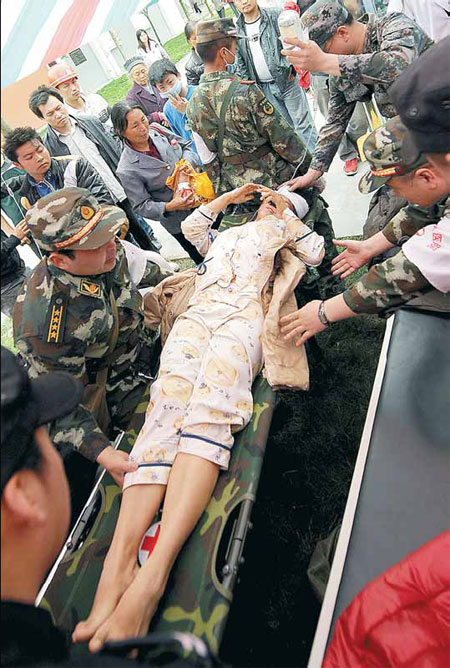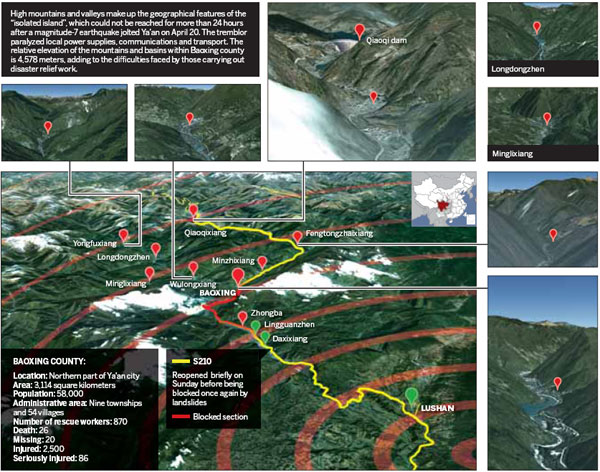County struggles to recover
Updated: 2013-04-22 07:22
By Tang Yue in Ya'an, Sichuan and Peng Yining and He Na in Beijing (China Daily)
|
||||||||
|
An injured resident is moved to a temporary shelter at Lingguan middle school in Baoxing county. Photos by Xue Yubin / Xinhua |
Although Baoxing was badly hit by Saturday's earthquake, the physical damage in the mountainous county was compounded by a failure of communications, a power outage and roads rendered impassable by fallen rocks. For many hours, Baoxing, just 30 kilometers from the quake's epicenter in Lushan county, was one of the most isolated places in the province.
A lack of medication meant a 40-year-old Baoxing resident underwent surgery on his injured legs without anesthetic. He resorted to biting on a piece of wood to prevent the excruciating pain from causing his facial muscles to go into violent spasm and damage his teeth, according to Chen Yuyong, leader of a 40-member medical team.
"Baoxing was completely cut off from the outside world at the time. There was no medication and no supplies, nothing," said Chen, who spent two hours hiking to the isolated area, arriving 14 hours after the quake. "But we had to perform the operation as quickly as possible. If we had left the dead tissue in place, it would have become infected and we might have been forced to amputate his legs."

Chen described how the surgeon made an incision in the man's lower leg to allow congealing blood to escape, and also picked out debris embedded in the wound. "Thirty minutes . . . in a tent. You can't imagine how painful the operation was. The man's face was as white as a sheet of paper and his face was contorted in pain."
According to Chen, the injured man was evacuated by helicopter on Sunday morning, along with 20 other seriously injured people. However, more survivors kept arriving, sporting a variety of gruesome leg injuries: Fractured bones, shredded tissue and deeply embedded debris.
By noon on Sunday, the local government confirmed that 26 people had died in Baoxing and more than 2,500 were injured, around 86 have life-threatening injuries.
Chen said the first priority was to prevent the severely injured from bleeding to death. Many required immediate surgery to control blood loss and prevent muscles and nerves from dying from lack of blood. "But the place was totally isolated and the situation was too poor for the complicated operations, such as amputations," he said.
The most severely injured were evacuated by helicopter, according to Chen, but medication, including skin creams and cold remedies, is urgently needed for those whose injuries were not as severe and those who remained in the county. Chen said his team's overriding aim in the coming days will be to prevent post-disaster illnesses, including diarrhea and dysentery, which could result from a lack of safe drinking water.
Impassable roads
Baoxing, which covers an area of 3,114 square km, is home to 58,000 people. The county administers nine townships and 54 villages. Pandas were first recorded there in the 19th century, leading to it becoming known as the "home of the Pandas".
The local geography, high mountains and low valleys, made Baoxing an "isolated island", according to one observer, in the aftermath of Saturday's tremblor. The relative elevation of the mountains is around 4,578 meters, which has added to the difficulties encountered by the relief workers.
Three roads leading from Lushan county to Baoxing were rendered impassable by landslides, although one reopened briefly at around 6 pm on Saturday after frantic efforts, according to Sichuan's provincial transportation department. The road was later blocked by landslides once again.
Approximately 200 members of the Sichuan Armed Police Force walked more than 10 km to Lingguan town, one of the places hardest hit in the county, arriving at 7 pm on Saturday, according to reports on China Central Television.
"Most of the houses have been destroyed and the roads leading in and out of the town have been blocked by landslides, which have hampered efforts to transport the severely injured," said Wang Qianjun, director of the Armed Police Force training department.
"We quickly came up with a plan: We transported the injured by vehicle to the places where the landslides blocked the road. Soldiers then carried the injured over the blocked areas to vehicles that were waiting to ferry them to the hospitals," he said.
More than 40,000 people are waiting to be relocated. Lingguan town, another of the most severely affected areas, is badly in need of helicopters to transport doctors and medicine for the critically injured. Most of the injured have fractures or head wounds, caused by falling objects. Supplies of food and medicine are limited. A makeshift hospital, essentially just a framework covered by cloth, has been set up in a school playground.
It took officers from Sichuan Public Security Fire Brigade more than two hours to hike to Lingguan town from their base in Lushan, a distance of less than 10 km, on Saturday night.
Rescuers were forced to crawl over the section of the road affected by the landslides. Loose rocks rolled down the cliffs and across the roads so frequently that people had to run to get past. Some attempted to shield their heads with rolled-up clothing and bags. Some of the rocks blocking the roads are as big as dining tables or cars and will need to be blasted clear.
"We have a shortage of tents, but rain is forecast in the next few days. At present, most of the displaced are living in homemade shelters built from plastic sheeting," said Ma Jun, chief of Baoxing county.
Most of the rescue workers in Baoxing are firefighters and soldiers. By noon on Sunday, their number had reached 870, but more were expected later in the day. A second team was attempting to access the county via local waterways, said Xinhua News Agency.
Electricity, water and gas supplies have been cut off and almost all the houses are damaged, including those rebuilt after the 2008 Wenchuan earthquake, according to Xinhua.
"We distributed some food to the victims, but there's no more water and we only have enough food for two more days. The fear of aftershocks means people dare not return to their homes to collect the things they need. Many slept in the open on Saturday night," said Ma.
"By 1 pm on Sunday, more than 1,000 injured people had received treatment at Lingguan town hospital. The landslides mean we can't use motorized transport and have to carry the badly wounded on stretchers so they can get treatment further afield," said Li Ming, director of Baoxing Health Bureau.
Rescuers injured
An excavator toppled over the edge of a 300-meter cliff as it approached Baoxing on Sunday morning. Firefighters from a station in nearby Aba Tibetan autonomous prefecture rushed to the spot to help, according to the Ministry of Public Security. The driver of the excavator and his passengers are likely to be have been badly injured, but no details were available at press time.
Chengdu Military Area Command dispatched about 20 helicopters on Sunday morning to transport emergency supplies and medical staff to Baoxing, Longmen county and Taiping town.
Yang Liu, a 40-year-old volunteer rescue worker from the Bluesky rescue team, a branch of the Beijing Red Cross, said he had lost contact with his 10 fellow volunteers who arrived in the county on Sunday. The fallen rocks that blocked the roads forced him to abandon his attempts to hike into Baoxing on Saturday night.
Normality is returning slowly: The first outbound phone call from Baoxing was made at 11:06 am on Sunday. Communications, including landline phones and the Internet, were restored at Baoxing county center before noon, following 27 hours of repair work by China Telecom, according to Xinhua.
That at least provided some cause for optimism for Zhou Xiaofeng, a Baoxing county official. He was in Ya'an when the earthquake struck. He was planning to walk home on Sunday morning, or, if possible, grab a ride on any available vehicle. He said more than 6,200 people, including members of his own family, live in his hometown, but he has not heard from them. "I called and called throughout the day, but no one answered the phone," he said.
Wu Wencong and Jiang Xueqing contributed to this story.
Contact the writers at tangyue@chinadaily.com.cn and pengyining@chinadaily.com.cn
|
Zhang Ye / China Daily and Google Earth |
(China Daily 04/22/2013 page4)

 Obama celebrates young inventors at science fair
Obama celebrates young inventors at science fair
 Earth Day marked around the world
Earth Day marked around the world
 Volunteer team helping students find sense of normalcy
Volunteer team helping students find sense of normalcy
 Ethnic groups quick to join rescue efforts
Ethnic groups quick to join rescue efforts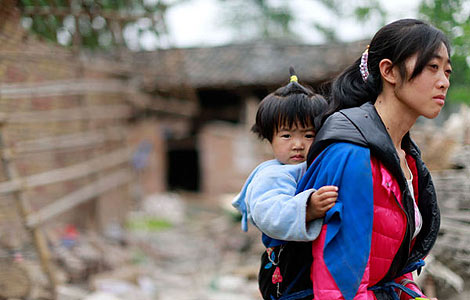
 Earthquake leaves family shattered
Earthquake leaves family shattered
 Boston Marathon bombing suspect charged
Boston Marathon bombing suspect charged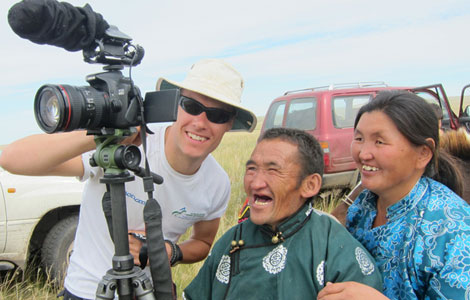
 Chasing vestiges of the Great Wall
Chasing vestiges of the Great Wall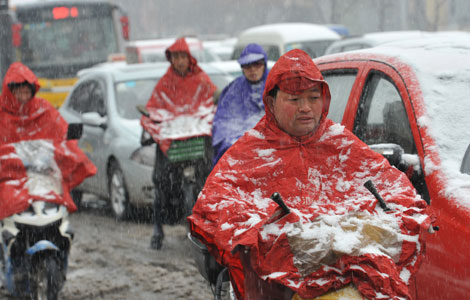
 Weekly Photos: April 15-21
Weekly Photos: April 15-21
Most Viewed
Editor's Picks

|

|

|

|

|

|
Today's Top News
Russia criticizes US reports on human rights
China 'aims to share its dream with world'
Chinese president appoints 5 new ambassadors
Nation's IPR suits see spike in 2012
H7N9 not spread between humans: WHO
Health new priority for quake zone
Sino-US shared interests emphasized
China, ROK criticize visits to shrine
US Weekly

|

|
